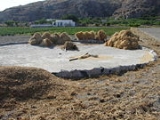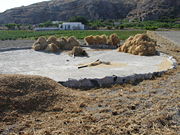
Horos
Encyclopedia
Horos, khoros, choros means "dance" in Greek language
. This word occurs in the names of numerous Greek dances, which may be literally translated as "dance of..." or "dance from...". Sometimes the word may be omitted, e.g., both "Hasapikos choros" ("Dance of butcher
s") and Hasapiko
may be seen in use.
In Ancient Greece
dance and song were inseparable parts of celebration and theatre. In fact the word choir
originates from "choros" as well (see Greek chorus
).
 Many Greek villages have a flat place chorostasi/horostasi (Χοροστάσι) where dances, weddings and other events take place. The term chorostasi denotes "threshing floor", i.e., the place where the threshing
Many Greek villages have a flat place chorostasi/horostasi (Χοροστάσι) where dances, weddings and other events take place. The term chorostasi denotes "threshing floor", i.e., the place where the threshing
of wheat was done, and after the end of harvesting it was clean and empty and hence a natural place for celebration. Therefore it is claimed that chorostasi gave both the name choros and the circular arrangement of the movement in the dance.
The dances Horo (Bulgaria
) and Hora
(Romania
) (both from Balkans
), and Horon altogether with horos have an ancient origin.
Greek language
Greek is an independent branch of the Indo-European family of languages. Native to the southern Balkans, it has the longest documented history of any Indo-European language, spanning 34 centuries of written records. Its writing system has been the Greek alphabet for the majority of its history;...
. This word occurs in the names of numerous Greek dances, which may be literally translated as "dance of..." or "dance from...". Sometimes the word may be omitted, e.g., both "Hasapikos choros" ("Dance of butcher
Butcher
A butcher is a person who may slaughter animals, dress their flesh, sell their meat or any combination of these three tasks. They may prepare standard cuts of meat, poultry, fish and shellfish for sale in retail or wholesale food establishments...
s") and Hasapiko
Hasapiko
The Hasapiko , is a Greek folk dance from Constantinople. The dance originated in the Middle Ages as a battle mime with swords performed by the Greek butchers guild, which adopted it from the military of Byzantine era. In Constantinople during the Byzantine times, it was called in Greek...
may be seen in use.
In Ancient Greece
Ancient Greece
Ancient Greece is a civilization belonging to a period of Greek history that lasted from the Archaic period of the 8th to 6th centuries BC to the end of antiquity. Immediately following this period was the beginning of the Early Middle Ages and the Byzantine era. Included in Ancient Greece is the...
dance and song were inseparable parts of celebration and theatre. In fact the word choir
Choir
A choir, chorale or chorus is a musical ensemble of singers. Choral music, in turn, is the music written specifically for such an ensemble to perform.A body of singers who perform together as a group is called a choir or chorus...
originates from "choros" as well (see Greek chorus
Greek chorus
A Greek chorus is a homogenous, non-individualised group of performers in the plays of classical Greece, who comment with a collective voice on the dramatic action....
).

Threshing
Threshing is the process of loosening the edible part of cereal grain from the scaly, inedible chaff that surrounds it. It is the step in grain preparation after harvesting and before winnowing, which separates the loosened chaff from the grain...
of wheat was done, and after the end of harvesting it was clean and empty and hence a natural place for celebration. Therefore it is claimed that chorostasi gave both the name choros and the circular arrangement of the movement in the dance.
The dances Horo (Bulgaria
Bulgaria
Bulgaria , officially the Republic of Bulgaria , is a parliamentary democracy within a unitary constitutional republic in Southeast Europe. The country borders Romania to the north, Serbia and Macedonia to the west, Greece and Turkey to the south, as well as the Black Sea to the east...
) and Hora
Hora
Hora is a type of circle dance originating in the Balkans but also found in other countries. The name is cognate to the Greek χορός : 'dance' which is cognate with the ancient Greek art form of χορεία; see Chorea. The original meaning of the Greek word χορός may have been 'circle'...
(Romania
Romania
Romania is a country located at the crossroads of Central and Southeastern Europe, on the Lower Danube, within and outside the Carpathian arch, bordering on the Black Sea...
) (both from Balkans
Balkans
The Balkans is a geopolitical and cultural region of southeastern Europe...
), and Horon altogether with horos have an ancient origin.

